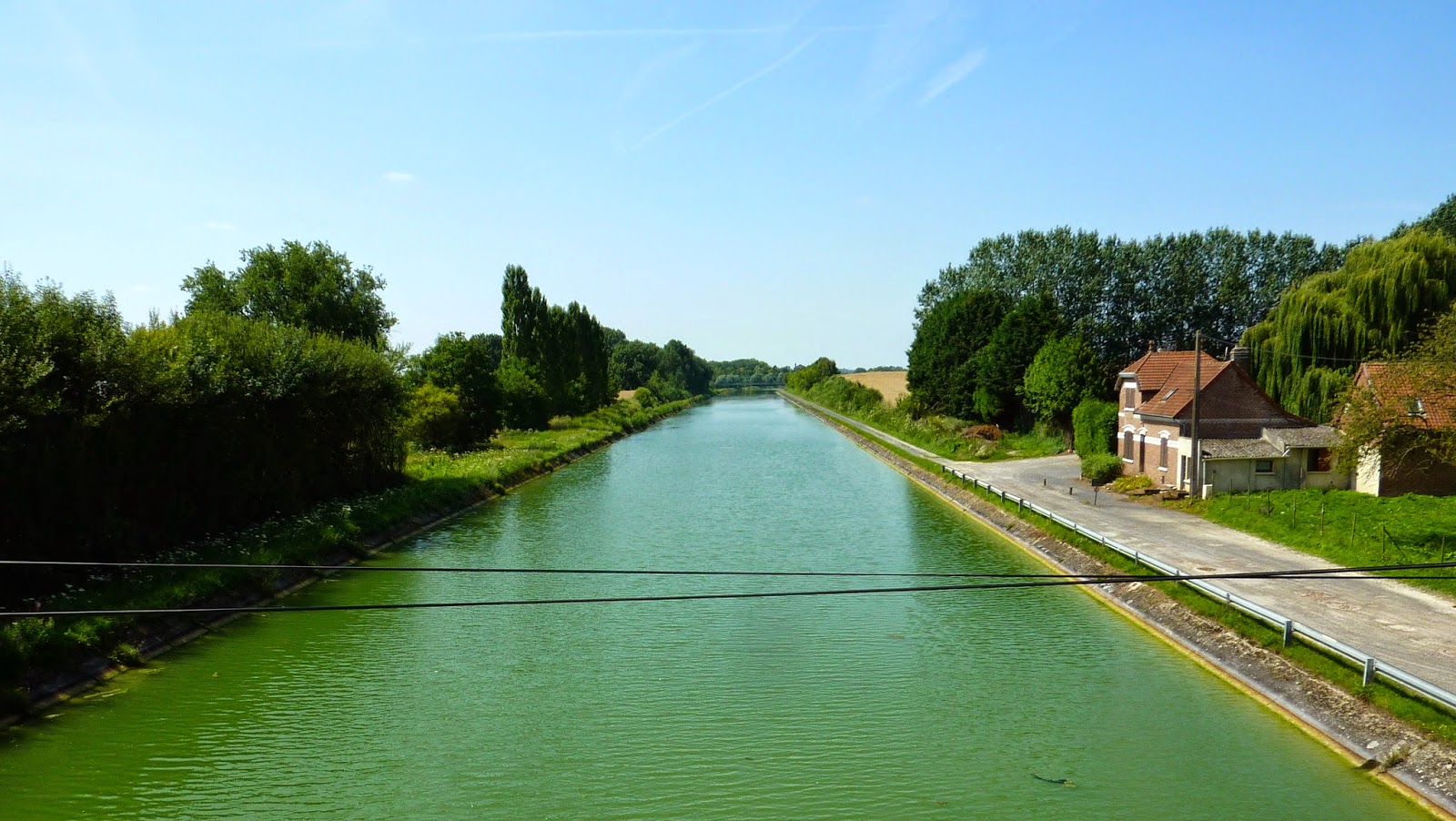 |
| The Canal du Nord. |
It was another day of cemeteries and flat farmland as I moved from the department of Pas-de-Calais into the department of the Somme. At midday I lost my way for a couple of hours in the forest of Bois de Saint-Pierre Vaast. Eventually, using the sun as my guide, I emerged from the woods, skirted a couple of huge, harvested fields, surprised a deer and flagged down a van at a crossroads of farm tracks. The farmer pointed out the road to Allaines, then offered me a lift, which I declined.
Hot and sweaty, I crossed the Canal du Nord, entered the attractive little town of Péronne and installed my tent in the Camping Municipal du Brochet ('brochet' means 'pike', and the site was built around a fish pond). As I headed down the main street in search of something to eat, I spotted Peter and Ernst. They had found a small, basic two-bed gîte opposite the church. We celebrated our reunion with pastis and beer at a restaurant opposite the castle. We ate omelettes. And we recounted our latest adventures.
 |
| The castle at Péronne. |
The next morning Peter and I decided to spend a few hours looking round the Historial de la Grande Guerre, the First World War museum housed in Péronne's medieval castle. I'm very glad we did. It was both fascinating and sobering. The Battle of the Somme had taken place nearby between July and November 1916: the biggest battle of World War I, in which more than 1,000, 000 men had been either wounded or killed — making it one of the bloodiest battles in human history. And the end result was a stalemate, with hardly any positional change in the Allied or German front lines. It was also the first battle ever in which tanks had been employed.
We hit the trail at 12.30 — very late — but still managed to walk 26 km before setting up our tents at the Camping du Vivier aux Carpes in Seraucourt-le-Grand. The first person we saw at the campsite was Ernst. He'd arrived early, pitched his tarp, settled himself in the campsite bar and had been entertaining other campers and caravanners for hours! He left at 7 am the next day, leaving a breakfast yoghurt for Peter and me in the grass outside our tents.
 |
| Typical farming landscape of the Somme. |
It was Saturday 2nd August, and I broke camp late as I wanted to use the site's washing machine and dryer. The day was very warm again, and I walked through the customary landscape of windmills and wheat fields, church spires and water towers. There was also a long section by the Canal de Saint-Quentin. Here I met a Frenchman and his two sons picking mirabelles — small, succulent wild plums. We fell into conversation, and they became utterly intrigued by my journey. They plied me with plums, chocolate, sweets and a glass of wine, and even wanted to fill up my backpack with potatoes! The younger son (his breath smelling heavily of drink) kept jabbing me in the chest, shouting repeatedly: 'Vous êtes courageux! Mais fou!' ('You are brave! But crazy!) Finally I managed to get away and continued along the towpath to Tergnier, a scruffy, down-at-heel railway town full of sidings and marshalling yards.
 |
| The Canal de Saint-Quentin. |
I caught up with Peter in Beautor and we made a wild camp at the edge of a cornfield just beyond Deuillet. It was a perfect spot: flat, with soft ground and no flies. Though, unfortunately, our sleep was interrupted by three farm dogs, whose barking echoed through the night . . .
 |
| Wild camping. |
5 comments:
Brave but crazy, eh?
So much of hiking is focused on the small things, like flies and heat, which loom large and annoying. To think that those men who fought also lived on the land and were, no doubt, bothered by flies and heat (and then cold and frostbite).
I am with you every step of the way Robert - and enjoying it from the comfort of an armchair.
Against the backdrop of that peaceful countryside, it's difficult to imagine the horror of the Battle of the Somme, the deadliest of WWII battles. One million lost in a battle that had no significant impact on the positions held by the Allies and Germany.
In the 20th century, more that one hundred million people were killed in war or genocide. Considering this fact and your description of the Battle of the Somme, I fully agree with what Eckart Tolle said in "The New Earth."
"If the history of humanity were the clinical history of a single human being, the diagnosis would be: chronic paranoid delusions, a pathological propensity to commit murder and acts of extreme violence and cruelty against his perceived enemies — his own consciousness projected outward. Criminally insane, with a few brief lucid intervals."
Bon courage, Robert. Especially of the crazy kind ;)
Thank, all four, for reading and commenting...
Amanda ;)
Post a Comment